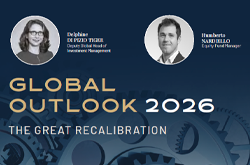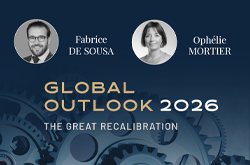America in a new decade: Will the US remain a superpower?
Download the Indosuez 2021 Global Outlook here
A new president takes his place in the White House, with almost as many uncertainties as there are certainties, and in a completely new economic, health, budgetary and monetary context. But does a change of decade and a change of presidency mean a change of era and a change in economic model?
The change of tenant in the White House should mark a significant change in style. Less unpredictable, less aggressive, more respectful of customs, institutions and international bodies, Joe Biden could also be less impactful and clearly breaks with his predecessor. In itself, this change is likely to be reassuring at first glance, but even with the vaccine game-changer, we can still raise questions on the leadership capacity of the new president in the face of unprecedented economic, technological, geopolitical and environmental challenges.
Climate change
On paper, it is obvious: the new administration intends to reconnect with the leadership displayed under Obama to engage the United States in energy transition and return to the framework of the Paris agreements. The “Build Back Better”1 plan includes a significant environmental component, which contrasts with Donald Trump's infamous climate-scepticism. Nevertheless, these developments will go beyond the framework of government plans and come from changes in the behaviour of individuals, companies and investors. The new administration’s ambition is important and seems genuine but will ultimately require strong leadership when confronted with powerful lobbies. The criteria for success will not be the signing of a law or international agreement, but a clear sign CO2 emissions are being curbed in a country where per capita energy consumption is amongst the highest in the world (behind only Gulf countries and Australia).
Geopolitics
It is a common belief that Joe Biden will be more open to the rest of the world, inclined to remain in the playing field of international institutions and multilateralism, while acting in a more predictable and consensual manner, which matters in diplomatic relations. These aspects are important, and will likely reduce geopolitical risk, with less international tensions and a less confrontational style. The United States could regain its diplomatic efficiency through the revival of its soft power, thereby rekindling international empathy for the red, white and blue. Beyond style, what’s at stake is maintaining the United States as the world's superpower. On this front, doubts about Joe Biden's energy, vision and political courage have fuelled the headlines since the primaries, and Donald Trump has played on this weakness in the debates.
Beyond the political colour and style of the President, we can possibly expect both a stronger global presence than over the past four years and, at the same time, a continued diminishment of US influence in world affairs, to the benefit of regional powers such as Russia, Iran or China. It is probable that China will emerge as the leaders of this new era, reaping the benefits of their stark opposition to Obama's Pivot to Asia, which they had characterised as a wilful desire to contain their rise to power.
Capitalism
Capitalism and technology in the 21st century are intimately linked. They have been present in every industrial revolution, but the ongoing digital revolution appears to be creating a strategic dilemma in Washington. Digital has given birth to giants that disrupt entire sectors of the economy, generating exponential profitability and dominating positions that are difficult to reverse. Silicon Valley's line of defence rests in particular on the fact that Washington is reluctant to destabilise its digital champions so as not to risk a shift in technological leadership to China. This is the underlying challenge of the current investigation conducted by Congress into the non-competitive practices of the FAANG2. Finally, if the implemen-tation of a radical approach to antitrust (dismantling of dominant positions or nationalization/regulation of natural monopolies) has little chance of seeing the light of day, it is safe to wager that these giants will learn how to adapt to more restrictive regulations and turn them into competitive advantages and heightened barriers-to-entry.
Socio-economic issues
Joe Biden's loaded programme denotes a desire to reverse a powerful trend of accelerating income and wealth inequalities, by introducing more progressive taxation and targeting higher income groups. First, however, we must debunk a Democratic myth: the working classes did not particularly benefit from the Obama years, which in part cost Hillary Clinton her victory; conversely, median real wages rose more during the Trump years. This should not be seen as a causality, but a coincidence linked to the fact that full employment in recent years had put an end to the stagnation of real wages. However, the state of wealth inequalities in the US, both under Democratic and Republican presidents, risks breaking what remains of a social pact based on the US promise of upward social mobility. The challenge of the envisaged reforms is as much to make the top 1% contribute more, as to involve the lowest rich 10% more effectively, thanks to higher salaries and better social coverage. However, the absence of a Democratic majority in the Senate greatly reduces the likelihood and potential scale of the tax reforms in Joe Biden's plan.
Beyond taxation, and after a period of heightened racial tensions, Biden intends to put forward more inclusive, targeted policies for minorities. This extends to the Federal Reserve (Fed) with the question of how best to integrate disparities in monetary policy. Beyond the moral justification and the expected effects of greater social stability, the impact on the labour-force participation rate, as well as the level of health and training on productivity justifies the implementation of such policies given their positive effects on growth and investment.
The risk however is that these initiatives will also be accompanied by an increase in the corporate tax rate, which could harm private investment, a risk that will be mitigated by a divided Congress. Our economic scenario also shows that the increased fiscal support will have positive short-term effect on growth, but will also result in a moderate rise in inflation, putting into question the sustainability of a zero-interest rate policy after 2022.
Public finances
As highlighted by the Congress Budget Office, no matter who holds the office of president, the COVID-19 crisis and the resulting policy-mix will be a vector for an unprecedented rise in federal debt. The latter had a known track record of stability or moderate increase during periods of growth, and derailing during cyclical downturns. However, under Donald Trump we witnessed an exponential rise in debt (as with Ronald Reagan). Biden clearly begins his term in uncharted waters in terms of the debt / GDP ratio. The sustainability of this ratio implies the unwavering support of the Fed, which should continue to structurally monetize these debts thereby structurally weighing on the value of the dollar, yet another development which should be favorable to China.
We conclude on the means America has to meet its ambitions and more generally on the conditions of power, defined by Robert Kagan3 as the ability to write history. Willingness is not enough for power, which also requires other tangible resources (economic, financial, military commercial power) and intangible characteristics (creativity, soft power, openness to the world, sense of responsibility). The new phase that is opening is an opportunity for the United States to reconnect with a more traditional conception of American power and rekindle its relationship with the world - halfway between idealism and realism. The danger, however, would be that the combination of a less marked leadership strategy, a stronger domestic focus and increased budgetary constraints together diminish the country's influence, from which economic benefits (the “dividends of peace”) are far from negligible.
1 - Joe Biden’s Jobs and Economic Recovery Plan for Working Families.
2 - Facebook, Amazon, Apple, Netflix and Alphabet.
3 - Robert Kagan is an American political scientist.
*Editorial of the Indosuez Global Outlook release of 30/11/2020
December 18, 2020




